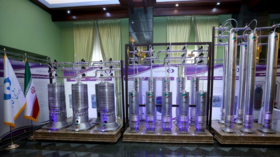Iran probes watchdog cameras in nuclear site ‘sabotage’
10 Dec, 2021 23:12
During a briefing in London on Friday, Iran’s envoy to the UK Mohsen Baharvand called on the International Atomic Energy Agency (IAEA) to allow authorities in Tehran more time to probe potential sabotage at a centrifuge workshop in the city of Karaj, which was also rocked by a mysterious explosion over the summer.
“There was a sabotage there by Israel and some cameras were damaged and there was some investigation going on,” the ambassador said, as cited by Bloomberg, adding that Iranian investigators are considering whether the cameras may have been used as part of the attack.
We just asked IAEA to wait for a time for that investigation to be over.
However, in official documents obtained by AFP last month, the IAEA “categorically” rejected the notion that its surveillance cameras played any role in the blast, after the Iranian government told the agency it was looking into possible sabotage.
Though no actor took responsibility for the June attack, the New York Times, citing intelligence sources, reported that the site in Keraj was on a list of targets that Israel presented to the Donald Trump administration sometime last year. It was far from the first strange incident at an Iranian facility, with a similar attack taking place on another site in Natanz back in April – also pinned on Israel by authorities in Tehran.
A series of IAEA monitoring devices were set up at nuclear sites after Iran limited access for inspectors, part of an effort to scale back compliance with a nuclear deal struck with world powers in 2015. The United States walked away from the pact under ex-President Trump, reimposing all sanctions and prompting Iran to gradually move away from its own commitments. Amid that fallout, a stop-gap agreement was struck with the IAEA to continue allowing remote surveillance at sensitive facilities, including the centrifuge complex in Karaj.
Washington, for its part, has urged Tehran to allow the IAEA to replace one camera destroyed in the June attack, even vowing an “appropriate response” should it decline to do so. The atomic watchdog itself has also raised concerns, with IAEA Director General Rafael Mariano Grossi stating last month that the agency is “close to the point when [it] would not be able to guarantee continuity of knowledge” concerning Iran’s nuclear energy program.
The sabotage probe continues as American and Iranian officials resume talks to revive the nuclear deal, which recently started anew following a lengthy hiatus. Despite the diplomatic efforts, however, the Joe Biden administration appears to be hardening its stance, even stating that Washington is now considering its “options” should the negotiations fail. Israel, too, has reportedly pushed to conduct joint military drills with the US to prepare for a potential strike on Iranian nuclear infrastructure in the event no deal is reached.


0 Comments:
Post a Comment
Subscribe to Post Comments [Atom]
<< Home